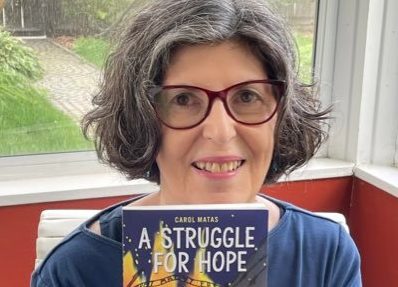After surviving the Holocaust as a teenager, Ruth now finds herself in Palestine during another war as Israel battles for its existence. Her brother is on the front lines, and Ruth and her boyfriend are taking care of children in a hospital.
To distract them, Ruth tells stories. That causes her to remember another time when she told stories, while in Auschwitz—and the horrors she experienced there. Through it all, she comes to understand that she needs to find a new way to live that promotes hope for a better world.
That’s the plot of A Struggle for Hope, by Winnipeg author Carol Matas.
The book, which will be launched online Nov. 4 as part of Winnipeg’s first-ever Holocaust Education Week, is intended to help Canadian young people learn more about the Holocaust.
“When I go to schools, I find many children don’t know about it, what a concentration camp is, the genesis of it,” said Matas, who has written 46 books, including others for young adult readers about the Second World War.
Through the book, readers discover what Ruth went through in Auschwitz, along with the horrors she saw and the friends she made and lost.
A Struggle for Hope also features her participation in a rebellion by some concentration camp inmates in early 1945.
“I included it to show that Jews fought back, they found ways to resist,” said Matas of that little-known true story of how some inmates blew up a crematorium at Auschwitz near the end of the war.
One of the big themes in the book is God.
“Ruth struggles with the question of whether there is a God and, if there is, what kind of God would allow something like the Holocaust,” Matas said.
She debates that question with others after the war, including with her atheist boyfriend who has concluded God can’t exist after what he has seen in the camps.
“They discuss and argue about whether the universe is moral, if there is a God,” said Matas. “I invite readers to come into that discussion with the characters and think about it. What kind of world do they want to create today, and what pitfalls can they avoid?”
For Belle Jarniewski, executive director of the Jewish Heritage Centre of Western Canada, and one of the organizers of Holocaust Education Week, holding the event in Winnipeg is important because of the amount of Holocaust distortion occurring in Canada and around the world today.
“There is a lack of knowledge about the Holocaust,” she said, adding this goes along with a rise in antisemitism.
The Winnipeg Jewish community has commemorated the Holocaust during Yom ha-Shoah, International Holocaust Remembrance Day and Kristallnacht, but Jarniewski felt it was also important to be more proactive in educating non-Jewish Winnipeggers about the genocide itself.
“The goal is to present this information so more people can know what happened,” she said, noting this becomes more important every year as the number of Holocaust survivors declines.
“Soon there will be no first-person witnesses,” she said.
In addition to the book launch, which starts at 7 p.m. on Nov. 4, other online events during the week include “Inheritance of Memory: Retracing a Grandmother’s Experiences Through the Holocaust and Beyond,” a conversation with author Rachel Cerotti (Nov. 3); the “Christie Pit Riot Retold,” about one of the worst outbreaks of antisemitism in Canada in 1933 (Nov. 8); “Speaking to Adolescents about the Holocaust,” with Winnipeg teacher Kelly Hiebert (Nov. 9); and a community-wide Kristallnacht event (Nov. 10).
Holocaust Education Week is sponsored by the Jewish Heritage Centre of Western Canada, the Jewish Federation of Winnipeg, Congregation Etz Chayim and Jewish Child and Family Services.
For more information about these events, and to register, visit www.jhcwc.org/programs









